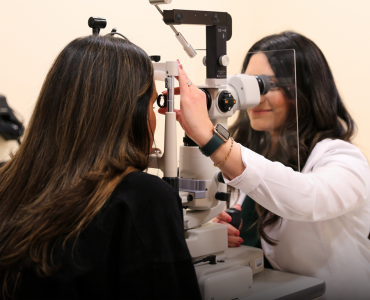
When you think about visiting the optometrist you are probably thinking about getting a new pair of glasses or contacts. That way you can see better. However, optometrists do a lot more than just correct your vision. They play a huge role in detecting systemic diseases. These are conditions that affect multiple organs or your entire body. The doctor can find these diseases all through eye exams. You may have heard the saying “Eyes are the windows to the soul.” That may be true. However, a more accurate saying is that “eyes are the window to your overall health.” In this blog, you will see how optometrists can find systemic diseases through your eye exams. As well as why it is so important to have regular eye checkups. As noted by the University of Virginia School of Medicine.
Your Eyes and Systemic Health: Your eyes are unique. They are the only part of the body where blood vessels and nerves can be seen non-invasively. This makes them a helpful window into your overall health. By taking a look at the blood vessels, optic nerve, and the eye as a whole, your doctor can get a lot of information. They can detect any signs of systemic diseases. Even if you have not had other symptoms elsewhere in the body.
Common Systemic Diseases Detected by Optometrists:
- Diabetes: Diabetic retinopathy is one of the most common systemic diseases that can be detected by an eye exam. This disease is a condition where high blood sugar levels can cause damage. This damage is caused to the blood vessels in your retina. Early signs can be microaneurysms, hemorrhages, and fluid leakage. It is vital for early detection. That way it allows for timely intervention. With the hope of preventing further damage. As well as to manage your diabetes more effectively.
- Hypertension: Hypertensive retinopathy is when high blood pressure can cause changes. Specifically in the blood vessels of the retina. Your doctor can spot the signs if you are going to your check-ups. These signs can be narrowing of the arteries and hemorrhages. In addition to swelling of the optic nerve. Catching this early can lower your risk of serious complications. Such as having a stroke or heart attack.
- Autoimmune Diseases: Autoimmune diseases like lupus and rheumatoid arthritis can show in your eye. This can lead to issues like uveitis or scleritis. The symptoms can range from a variety of things. They can show inflammation, redness, and pain.
- Cholesterol Diseases: During an eye exam your doctor can see cholesterol deposits. They can see this in the retinal blood vessels. This is known as Hollenhorst plaques. These deposits can show high cholesterol levels.
Importance of Regular Eye Exams
Eye exams are vital. So that your optometrist can detect systemic diseases early on. This also applies to those who do not need vision correction. Eye exams involve dilating your pupils. This allows your doctor to take a look at the retina and optic nerve. This process is key for identifying even the smallest changes in your eye. Which may indicate an underlying health issue. Early detection has a great impact on your overall health. Early diagnosis and treatment can prevent complications. Along with improving your quality of health. For example, managing diabetes and hypertension early can prevent serious issues down the road. Issues like blindness, kidney disease, and heart attacks.
Visit Clinicas
Eye exams are not just about corrective vision. They are a key part of taking care of your overall health. Optometrists help play a huge role. They can catch serious conditions early. Thus ensuring a better outcome for you as a patient. Make an appointment today at Clinicas del Camino Real, Inc. Vision Care Services. Don’t wait for symptoms to appear. Meet with a Clinicas Optometrist to stay on top of your health. Your eyes are the window to your overall health. Let Clinicas help you see clearly. As well as live healthily.

